Times Change, No. 1
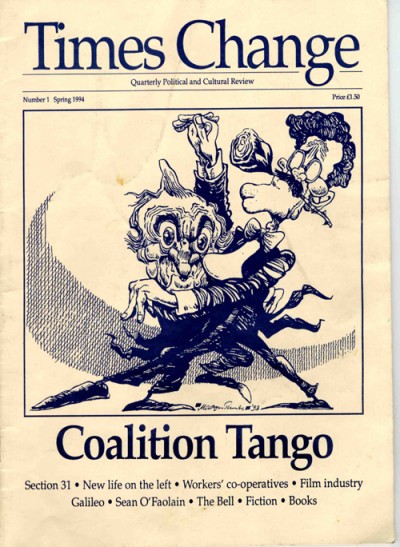
| Date: | 1994 |
|---|---|
| Organisation: | Democratic Left |
| Publication: | Times Change |
| Issue: | Number 1 Spring 1994 |
Contributors:
Info | John Barry, Prionsias Breathnach, Des Geraghty, Maurice Goldring, Ellen Hazelkorn, Stephen Hopkins, Sean Kelly, George O'Brien, Gerard O'Quigley, Henry Patterson, Ruth Riddick, Paddy Smyth |
| Type: | Publication Issue |
| View: | View Document |
| Discuss: | Comments on this document |
| Subjects: | Downing Street Declaration, 1993 Section 31 of the Broadcasting Act |
Please note: The Irish Left Archive is provided as a non-commercial historical resource, open to all, and has reproduced this document as an accessible digital reference. Copyright remains with its original authors. If used on other sites, we would appreciate a link back and reference to The Irish Left Archive, in addition to the original creators. For re-publication, commercial, or other uses, please contact the original owners. If documents provided to The Irish Left Archive have been created for or added to other online archives, please inform us so sources can be credited.
Commentary From The Cedar Lounge Revolution
27th February 2012
This first edition of Times Change is of particular interest because it is the first published example of the thinking of Democratic Left after its establishment outside of election manifesto’s [for more Times Change please see here ]. As such its contents suggests a broad range of interests, from articles on the European left, an analysis of the first year of the Fianna Fáil/Labour coalition, a staunch defence by Des Geraghty of ‘social enterprise’ against ‘economic chaos, while Proinsias Breathnach examines ‘workers’ co-operatives. What’s also of interest is the avowedly ‘cultural’ aspect to the publication. Ruth Riddick writes about the then nascent Irish film industry, George O’Brien about the legacy of Sean O’Faolain and Maurice Goldring discusses the role of The Bell during the war period and after. Add to this a short story and a poem as well as reasonably extensive book reviews and it is clear that Times Change sought to position itself some ways from its Workers’ Party predecessor, Making Sense.
An article by Paddy Smyth on Section 31, only then recently done away with by the coalition provides an example of some thinking within the party. Smyth cautiously welcomes the development and argues that ‘the notion that Joe Public is likely to switch parties because FF has received marginally more of its ‘fair’ share of sound bites is one that is deeply contemptuous and patronising of the citizen. It assumes a passivity on the part of the audience that is simply not supported by the evidence’. And he continues ‘It is is no more true to say that ‘there was no sex in Ireland before television’ than to suggest that a gullible public will have its fundamental values shaken by its occasional exposer to Gerry Adams on television’.
Smyth goes further and argues that the ‘mistaken notion of the passive and gullible audience is far more central to the argument about Section 31 than arguments about the civil rights of Sinn Féin supporters or journalistic rights’.
And he makes a basic point that ‘the truth is the status quo on S31 was no longer tenable. The recent report of the UN HRC argues quite correctly that the actual threat to our state is not such as to justify either a state of emergency or the provisions of the broadcasting ban.The government is under an international obligation to repeal it’.
The editorial under the heading “Adams agonistes” engages with Sinn Féin and the Downing Street declaration. Stating that while the IRA had not formally rejected it, it argues that the Provisional response had been ‘thus far singularly negative’. And it suggests that ‘The protracted consultation of SF members (administered by the Orwellian-sounding ‘Peace Commission’) is an elaborate charade. SF is an instrument of the IRA,and democratic debate is not part of conspiratorial politics. Likewise peace is not the first item on the IRA agenda’.
Indeed the view is profoundly pessimistic.
Rather the diehards of the IRA are intent on victory. Having failed to achieve this through violence, they thought they had found the answer in the Hume/Adams initiative. The IRA viewed Hume/Adams not as a peace process but as the foundation stone of a pan-nationalist front which would eventually involve the Irish government. It has been a long-term strategy of the Provisionals to embroil the Republic in the Northern conflict. Hence the attempts to foment civil war in the Seventies, and the emotional blackmail of the hunger strikes. This time with John Hume on board, the Provisionals thought they were home and dry.
And later it suggests that ‘[Hume/Adams] would have been the catalyst for another 20 years of violence’.
That said it also acknowledges − albeit seemingly in the context of working around rather than with SF - the need for ‘[a] settlement with or without all parties… cross-border institutions [which] should be established to underpin such a settlement, which would also formally acknowledge the equal rights of all identities and traditions in NI. A settlement of this kind will require nothing less than a historic compromise if it is to succeed. It will not give everybody everything they want. But it will provide the means whereby legitimate political objectives can be pursued in peace and democracy.’
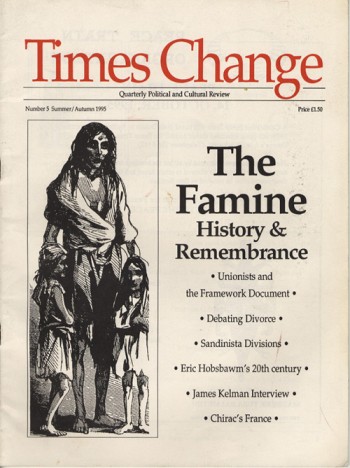
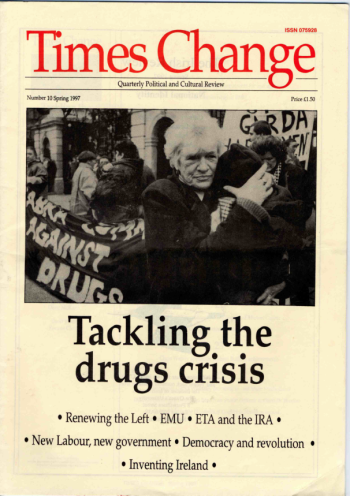
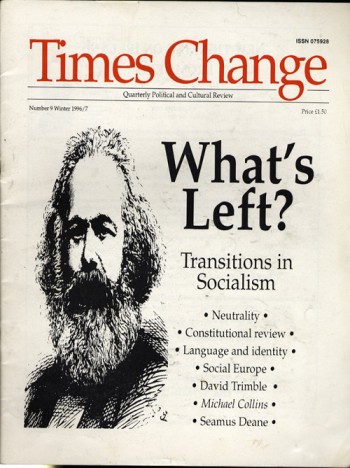
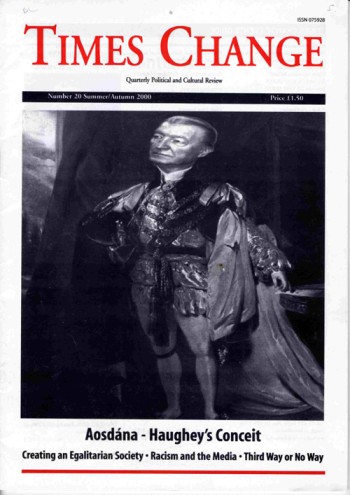
Comments
No Comments yet.
Add a Comment
Comments can be formatted in Markdown format . Use the toolbar to apply the correct syntax to your comment. The basic formats are:
**Bold text**
Bold text
_Italic text_
Italic text
[A link](http://www.example.com)
A link
You can join this discussion on The Cedar Lounge Revolution
By: Stop the Anglo payments | Irish Free Press Mon, 27 Feb 2012 09:03:48
[…] Left Archive: Times Change, Number 1, Spring 1994 ? Democratic Left 02:48 Mon Feb 27, 2012 | WorldbyStorm […]
Reply on the CLR
By: Logan Mon, 27 Feb 2012 12:03:10
I remember this publication. I think I got a free one from the DL stand in freshers week in UCD one year (the FF stand was giving out free beer, if I remember rightly).
I remember being struck by the use of the term “pan-nationalist front” in the magazine. It was a Unionist politicians term, I think I had only heard it from Conor Cruise O’Brien in the South before. Struck me ( knowing nothing of WP history at the time) as strange….
I remember somebody saying to me after seeing me with one of the issues of it that the the economic analysis in ‘Times Change’ felt like it had been written by a disgruntled lefty backbencher in the British Labour Party, and the political analysis of the North felt like it had been written by a disgruntled rightwing Tory backbencher.
Reply on the CLR
By: Drithleóg Mon, 27 Feb 2012 12:11:02
It is exactly 20 years since the Workers Party split (23rd Feb 1992). Amazing there has been no analysis or look back in the media (at least none that I’ve seen).
Reply on the CLR
By: RosencrantzisDead Mon, 27 Feb 2012 12:14:42
In reply to Drithleóg.
If you are lucky and go to mass every sunday, Eoghan Harris might dedicate a series of his columns to that very subject.
Reply on the CLR
By: Dr. X Mon, 27 Feb 2012 13:12:00
In reply to RosencrantzisDead.
And then you can claw your own eyes out with a spoon.
Reply on the CLR
By: TheOtherRiverR(h)ine Mon, 27 Feb 2012 15:56:06
I noticed a few Martyn Turner cartoons in the document. Was he ever a member of sympathizer by any chance?
Reply on the CLR
By: E Mon, 27 Feb 2012 18:56:31
Would you believe, the Times Change website is still active…http://homepage.eircom.net/~higher/index.htm
Reply on the CLR
By: WorldbyStorm Mon, 27 Feb 2012 19:14:29
In reply to E.
Wow, great find.
My abiding memory of DL is being at the Annual Conference IIRC in c.1994 and a man stood up to say that he had heard from various people in positions of authority in the party that there was no chance that Sinn Féin and the IRA would make any effort to move towards a real engagement, and yet, as he said the dogs in the street knew it was coming.
And it just struck me at the time that that summed up the problem in the party. That there were modes of thought about Republicanism and its incapacity to adapt and be flexible that made no sense in the context of their history. If the WP could have moved away from armed struggle then why not other groups? There was a weird essentialism about it… ‘we can do it but no one else’.
I’m not certain that that had any major impact on their approach subsequently, I left soon after, butI don’t think it’s unreasonable that a blindness in that regard might be replicated in other areas.
Reply on the CLR
By: Dr. X Mon, 27 Feb 2012 19:27:05
In reply to WorldbyStorm.
The older WP stuff you’ve posted in the Left Archive has had a consistent thread of people with something to say and a message they wanted to communicate to the outside world. Times Change, on the other hand, strikes me in retrospect as a document produced by people huddling together in a political climate that had suddenly gone very cold.
Reply on the CLR
By: WorldbyStorm Mon, 27 Feb 2012 19:51:17
In reply to WorldbyStorm.
And ironically, maybe looking to older certainties to sustain them…
Reply on the CLR
By: HAL Mon, 27 Feb 2012 22:31:37
The dogs in the street seem to get called upon a lot at different DL conferences when evidence was shortcoming Those dogs were particulary busy at the special Dun Laoghaire conference.
Reply on the CLR
By: Mark P Tue, 28 Feb 2012 07:58:02
In reply to Logan.
Democratic Left’s approach to the North was, all things considered, pretty grim but I’m not sure that the use of the term “pan nationalist front” was all that problematic. The term was extremely popular with Unionists, but its actual content did reflect important strands of Provisional strategic thinking at the time.
Reply on the CLR
By: Dr. X Tue, 28 Feb 2012 08:11:52
In reply to Mark P.
It depends how the term was used, I suppose. The mainstream Unionists, notoriously, always wanted to negotiate with the previous generation’s nationalist leadership. Talking up the idea of a pan nationalist front would have been a useful way of writing off the SDLP as potential negotiating partners, condeming them in advance as pawns of the Bearded One.
And for loyalist paramlitaries, the concept of a pan-nationalist front had the added advantage of expanding the number of “legitimate targets”.
Not that that was how DL were using it, mind. For them, it was part of the whole emotional psychodrama they’d been on since the 1969 split.
Reply on the CLR
By: Mark P Tue, 28 Feb 2012 08:36:31
In reply to Mark P.
Those are fair points, but it’s always worth bearing in mind that the term, or at least the thinking behind the term, didn’t spring fully formed from the minds of the Provisional’s opponents, whether Northern or Southern.
Reply on the CLR
By: Mark P Tue, 28 Feb 2012 09:18:43
On the publication itself, it’s really, well, shit, isn’t it?
Boring and superficial and, in so far as it goes near politics, mostly glib and wrong. The article on Labour in coalition by Paterson and Hazelkorn isn’t bad, although the passage of time has given it a certain amusement value.
Reply on the CLR
By: Dr. X Tue, 28 Feb 2012 09:27:43
Another point: The editorial refers to an alleged desire by the PIRA to bring the 26 counties into the conflict. “Hence the attempts to foment civil war in the seventies” – what are they talking about here?
Reply on the CLR
By: Michael Carley Tue, 28 Feb 2012 09:33:49
In reply to Dr. X.
Civil war with the Sticks?
Reply on the CLR
By: Mark P Tue, 28 Feb 2012 09:38:21
In reply to Dr. X.
Good question.
Reply on the CLR
By: Ed Tue, 28 Feb 2012 16:15:51
In reply to Dr. X.
Well it was fairly standard for the Officials in the 70s to accuse the Provos of trying to provoke a sectarian civil war in the North. so presumably that idea was inherited by the DL heads. AFAIK the only other person who believed that the Provos were trying to use the ‘pan-nationalist front’ to bring the southern government into war with Britain was Conor Cruise O’Brien, in his dottiest phase as a pundit.
It think the Martyn Turner cartoons are symptomatic in a way – this is more like the Irish Times than any left publication I’ve seen from the 70s or 80s. The articles on Sean O’Faolain could go straight into the Weekend section, couldn’t they? Not that I’m against left publications writing about culture (far from it), but this really feels like something that’s aimed at IT readers.
Reply on the CLR
By: Ed Tue, 28 Feb 2012 16:16:22
In reply to Ed.
“I” think obviously …
Reply on the CLR